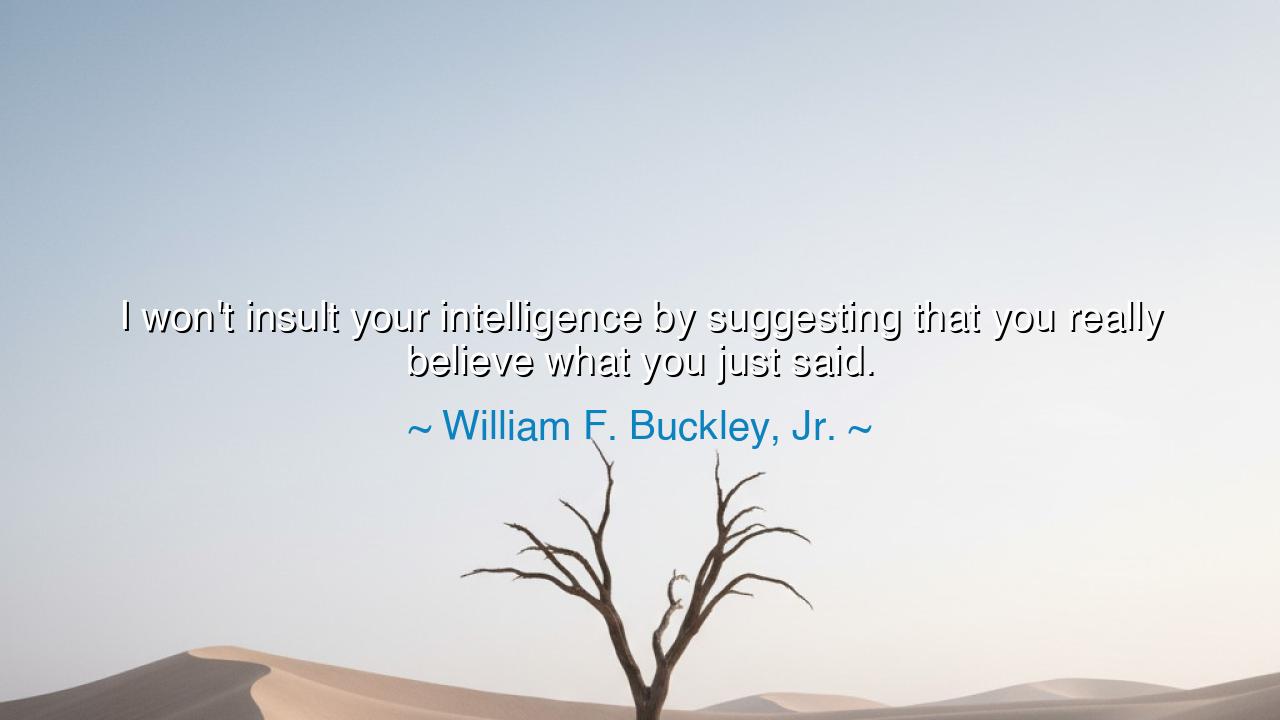
I won't insult your intelligence by suggesting that you really
I won't insult your intelligence by suggesting that you really believe what you just said.






"I won’t insult your intelligence by suggesting that you really believe what you just said." — William F. Buckley, Jr.
Thus spoke William F. Buckley, Jr., the great American intellectual and orator, whose words could cut with the precision of a blade and yet sparkle with wit like the sun upon steel. In this sharp and masterful phrase, he does more than rebuke folly — he exposes the deep human tendency toward self-deception. For when Buckley says, “I won’t insult your intelligence,” he implies that the speaker he addresses is not merely wrong, but knowingly insincere — that their words betray not ignorance, but dishonesty of mind. It is a call to intellectual integrity, a demand that thought and speech align with truth, lest reason itself become a game of vanity.
Buckley, founder of National Review and one of the twentieth century’s most eloquent defenders of reasoned debate, lived in an age of ideological battle — a time when political argument often replaced genuine inquiry. His wit was his weapon, but his weapon always served a principle: that intelligence, the divine light of discernment, must not be wasted on falsehood. He wielded this line not to humiliate, but to remind his adversaries that honesty is the highest form of respect. To engage in argument without sincerity, he believed, is to mock the intellect — one’s own and another’s. Thus, his words strike not only the foolish, but all who speak without believing, or believe without thinking.
The deeper meaning of the quote lies in the recognition that truth and intellect are bound together. Intelligence without integrity is cleverness without soul. To knowingly defend what one does not believe — whether for power, pride, or applause — is to turn wisdom into a tool of deceit. Buckley’s phrase reveals the quiet tragedy of those who trade truth for convenience. He refuses to “insult” the other’s intelligence precisely because he assumes they are capable of better — that deep down, they know their own words ring hollow. His statement is both an accusation and an invitation: an accusation of hypocrisy, and an invitation to return to honesty.
Such moments of intellectual courage have marked all of history. Consider Socrates, who stood before his accusers in Athens and refused to speak falsehood even to save his life. He challenged those who claimed to know truth but acted against it. When they condemned him, he drank the hemlock rather than betray the integrity of his thought. Like Buckley centuries later, Socrates understood that intelligence is sacred — that it must never be used to justify what the heart knows to be untrue. To lie knowingly is not merely to err; it is to sin against the light of reason itself.
Buckley’s words also serve as a mirror for our own age, when cleverness too often masquerades as wisdom. In an era of endless voices, where opinions are traded like currency, the temptation grows to speak not from conviction but from calculation — to say what pleases, what persuades, or what wins applause, rather than what one believes. But the wise soul remembers: to speak without sincerity is to darken the very light of understanding. When words lose their tether to belief, meaning itself begins to decay. The world is not healed by those who argue well, but by those who think truly and speak honestly.
There is also a note of mercy in Buckley’s tone — a recognition that intelligence deserves respect, even in error. He could have said, “You are a fool,” but he did not. Instead, he implies that the person before him knows better. This is a subtle yet profound difference. To mock is easy; to challenge one to rise above self-deception is noble. Buckley’s rebuke is, therefore, not just intellectual but moral. It calls us to examine our motives whenever we speak. Are we defending truth, or defending ourselves? Do our words illuminate reality, or do they obscure it behind pride and vanity?
So, my child of reason and conscience, take this lesson into your own life: guard the harmony between what you know and what you say. Let your intellect serve truth, not ego. If you do not believe a thing, do not pretend to defend it; if you do believe it, defend it with clarity, humility, and grace. The wise do not fear being wrong — they fear being false. Speak always with sincerity, for every insincere word leaves a shadow upon the soul. As Buckley teaches, the greatest insult to intelligence is not ignorance, but pretense. Let your mind and your speech walk together in light, and you shall honor both truth and yourself.






AAdministratorAdministrator
Welcome, honored guests. Please leave a comment, we will respond soon